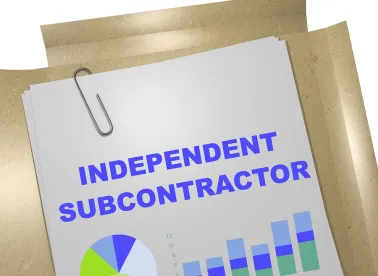While general or prime contractors have always faced the risk of liability for the actions or inactions of their subcontractors, an increase risk of state statutory liability for certain actions and inactions of subcontractors may be on the horizon.
Employees of subcontractors have brought claims against general contractors alleging liability for harassment, discrimination, wages, safety violations, injuries, and so on. Typically, the subcontractor’s employees have been successful only where they can establish liability through a joint or single employer relationship between the general contractor and subcontractor.
Recently, states have started creating statutory liability for general contractors for certain actions and inactions of their subcontractors. Virginia is an example. The state passed a series of employment laws this summer that includes statutes on nonpayment of wages, worker misclassification, and wage theft that contain new penalties, damages, and causes of action.
Under the revised Virginia Wage Payment Act, Virginia Code § 40.1-29, any employer who willfully and with intent to defraud fails or refuses to pay wages can be found criminally and civilly liable. The new law allows the state Commission of Labor and Industry to assess penalties for each violation. If the employer knowingly failed to pay wages, wages owed may be tripled as part of damages. When the Virginia Wage Payment Act is coupled with new Virginia Code § 11-4.6, contractor liability can increase dramatically. Under an amendment of Title 11-Contracts adding § 11-4.6, for any construction contract entered after July 1, 2020, a general contractor and any subcontractor at any tier can be jointly and severally liable for failure to pay wages to any subcontractor’s employees.
Virginia also created a presumption that workers are employees and not independent contractors, requiring employers to demonstrate independent contractor status using the IRS guidelines. Amendments to the Board for Contractors statute (§ 54.1-1102) require contractors to appropriately classify all workers as employees or independent contractors. Any contractor found to have intentionally misclassified any worker is subject to sanction by the Board. Consequently, misclassification violations can result in debarment from public contracting in Virginia, as well as the ability of the misclassified employee to bring a lawsuit for damages. Damages can include all benefits the employer provided its employees, such as insurance, retirement benefits, and so on.
With state statutes like these becoming more commonplace, contractors will want to act now to limit this type of liability. Start by closely reviewing contracts with subcontractors. Consider including indemnification provisions and coverage of attorneys’ fees and costs in the event of a claim. Consider enhanced payroll requirements on contracts or use of certified payrolls. Review lien release language for wage and hour and misclassification claim liability. Moreover, consider requiring insurance verification and being named as an additional insured. Finally, ask subcontractors to attest to compliance with state and federal employment law requirements.




 />i
/>i
